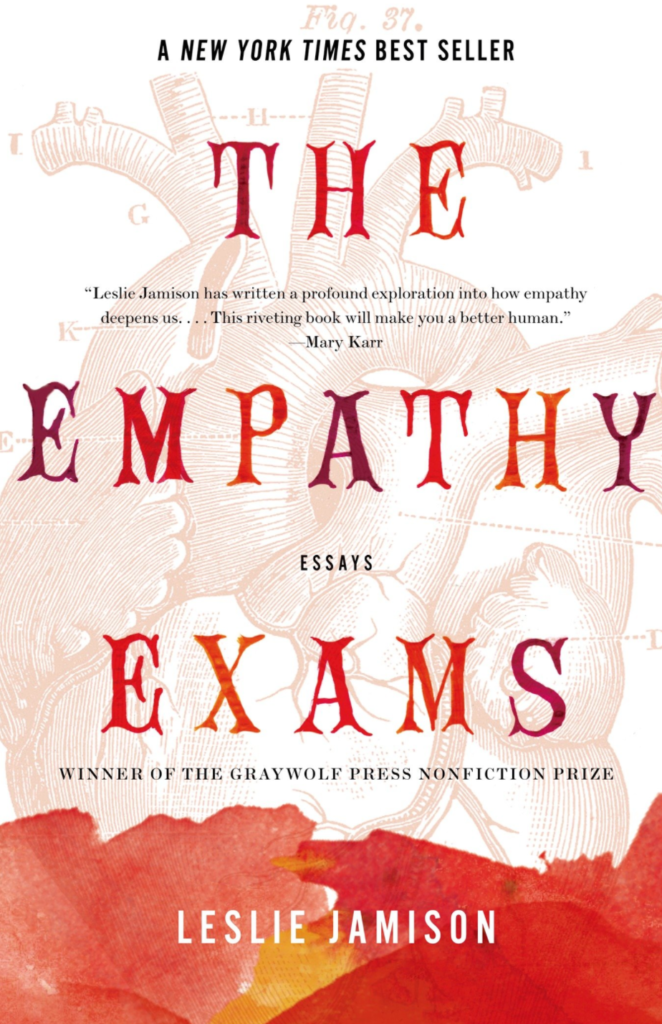We can be empathetic for many reasons towards a variety of people. Is it in our human nature to consciously be empathetic? Or is it our evolutionary neurotransmitters forcing us to empathize? Either way, it might be the only social skill you need in order to succeed with others. Let’s first discover the science of why we emphasize, shall we?
-by Erin Stark
Let’s say something bad happens to your arch nemesis, do you ever wonder why you feel a pang of guilt and start to even empathize with them?
Leslie Jamison addresses the feeling of empathy in her book The Empathy Exams.
She attempts to explain what it means to feel the pain of others through a collection of essays that creates a refreshing alternative in literature. The beauty of The Empathy Exams is that it brings us to question this feeling of empathy and situations that make us feel for other humans.

photo via
She takes the reader on a journey that allows them to develop thoughts on what it means to be empathetic. She spends time reflecting on her time as a medical actress. She assumes the role of sick characters and reflects on her past. This collection brings the reader to question if empathy takes effort and if that effort discredits the feeling of empathy.
A hard-hitting excerpt reads:
“Empathy isn’t just something that happens to us—a meteor shower of synapses firing across the brain—it’s also a choice we make: to pay attention, to extend ourselves. It’s made of exertion, that dowdier cousin of impulse. Sometimes we care for another because we know we should, or because it’s asked for, but this doesn’t make our caring hollow. The act of choosing simply means we’ve committed ourselves to a set of behaviors greater than the sum of our individual inclinations: I will listen to his sadness, even when I’m deep in my own. To say “going through the motions”—this isn’t reduction so much as acknowledgment of the effort—the labor, the motions, the dance—of getting inside another person’s state of heart or mind. This confession of effort chafes against the notion that empathy should always arise unbidden, that genuine means the same thing as unwilled, that intentionality is the enemy of love. But I believe in intention and I believe in work. I believe in waking up in the middle of the night and packing our bags and leaving our worst selves for our better ones.”
Empathy can also be broken down in a literature sense, according to Merriam-Webster, it is:
-
The imaginative projection of a subjective state into an object so that the object appears to be infused with it.
-
The action of understanding, being aware of, being sensitive to, and vicariously experiencing the feelings, thoughts and experiences of another of either the past or present without having the feelings, thoughts, and experience fully communicated in an objectively explicit manner.
The first definition suggests that empathy might be an appearance and not be the reality of what is happening. Where as the second definition alludes to it being an effort that humans go through to feel for others depending on possible circumstances.
Scientifically, there are these neurons that are self-explanatory! They are called mirror neurons. These neurons are a phenomenon that have a scientific claim to be the reason we mimic each other. They point to empathy being human nature and not a conscious decision. The neurons are further explained in a Ted Talk by neuroscientist Vilayanur Ramachandran. These neurons were recently discovered, however they are thought to be the building blocks that have ultimately helped us form social behavior.
Empathy is important in the complex world of today as everyone goes through personal challenges daily. Building a support system of humans that practice empathy can make a positive environment what it is. Part of building that support system is having that empathy towards the people you come across, in both business and pleasure. It goes back to the cliche of being the friend that you want in your life and attracting the good vibes you put off.
Feeling for others, no doubt, taps into our deeply ingrained emotions. It doesn’t hurt to remember the importance of stopping and admiring the beauty that comes with being human. We should learn to allow ourselves to accept it as a multi-faceted emotion that ultimately makes us human and likable. Whether empathy happens naturally from the mirror neurons we contain or through conscious effort, empathizing is indeed a beautiful part of social intelligence and amps up the likability factor.
-E.S.


4 comments
Important to realize that empathy is important and natural, regardless of confusion or social pressure that it might bring with it! It’s a beautiful part of being human that we shouldn’t let confuse us. We should welcome it:)
I love this! Thank you for sharing, I want to read the book now!
It’s so important to have empathy for others. Not many understand how truly powerful it is. I’ll be sure to check out this book!
Love this, can’t wait to get my hands on this book. A must read!